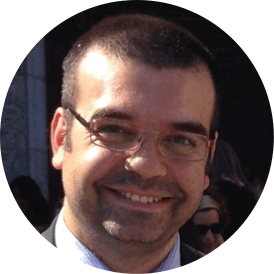Toward the Unity of Knowledge
- 29 de nov. de 2016
- 2 min de leitura

I've recently read an article of Basarab Nicolescu, a physicist, on a topic that always intrigued me because I identify much of its contents with my life experience.
The topic is...
transdisciplinarity
The way disciplines interact can be categorized in
multidisciplinarity,
interdisciplinarity,
and transdisciplinarity.
Multidisciplinarity concerns studying a research topic by several disciplines simultaneously. It's like putting in a single room a philosopher, an economist, a sociologist, an engineering and a medic to study the implications of cloning to humanity. All have something to say, but the goal of each interlocutor remains within his discipline.
Interdisciplinarity is different. Despite the field of work of each interlocutor, they get together to understand if we can:
transfer methods from one discipline to enrich the other;
transfer knowledge from one discipline to the other;
or have some insight into the possibility of generating a new discipline as a synthesis of two or more.
However, even if the interaction in this case is much higher, the goal of each interlocutor remains within his background field of work. Meaning an engineer still sees things from his point of view.
Transdisciplinarity, like the name explicits, implies an interaction between disciplines, across their different scopes and goes beyond them. When these people inside the room follow a transdisciplinarity approach, they're not concerned about their discipline and how can they contribute. Their concern is mutual, aimed at understanding of the present world, and ultimately the unity of knowledge.
I'm sure there are several interpretations to what this approach might be, concretely. The interpretation I would like to develop has certain characteristics.
Willing to lose your knowledge
You do not enter a meeting following a transdisciplinarity approach sure of what you know. No. You must leave everything you know at the door. That is the only way to make sure your mind is open to the novelty emerging from the reciprocal sharing of ideas and thoughts.
The loss of knowledge means giving it
To lose knowledge doesn't mean forget it. It means you feel the relentless desire to share it. Give it freely because it makes little sense to keep it for yourself.
Listen first, speak later
You should be more willing to listen than speaking. This means the other's idea has an extreme value to you. It's like a drop of water in desert after a long day under the sun in a clear sky. You're desperate to drink the drop of knowledge the other is sharing with you. The one speaking is the only person in the world to you, so you listen, right?
Speak detached from the idea
Reciprocity implies your sharing, but do it detached from the other opinion or judgement. Every word you speak is pouring your drop of water in the ocean of knowledge all of us are immersed in. Giving an idea implies it's no longer yours. It is a gift. The outcome won't be your idea, or the other's, but the idea emerging from the relational moment experienced together.







Comentários